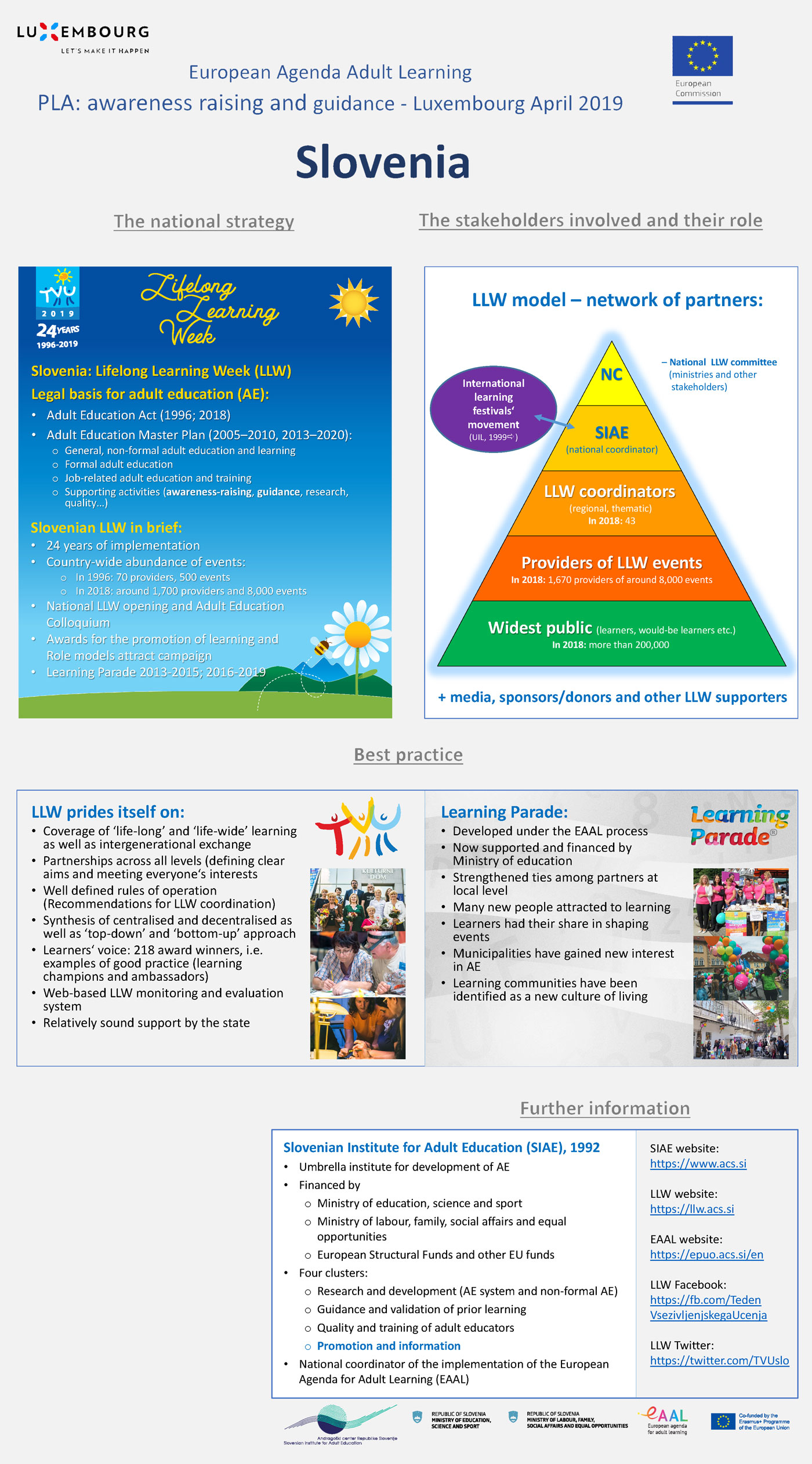A three-member Slovenian team comprising Mateja Šmid, Director of Kranj AEC, Darijan Novak and the author of this article, both of whom are from the SIAE, were in Luxemburg from 3 to 5 April. The host of this year’s international PLA event within the scope of the EAAL project was the AE Department at the University of Luxemburg Ministry of Education. The SIAE Newsletter has already reported on the first PLA event dedicated to the evaluation of non-formal and ad-hoc learning (Bonn, December 2018) as well as other cooperation between the stakeholders in the assurance of basic skills (Haag, February 2019). The topics of this meeting of national coordinators and other experts included awareness-raising and AE guidance.
Even before the official portion of the meeting, the representatives of the EACEA briefed us on the findings of the review of our interim reports on the current EAAL projects and invited us to eliminate eventual deficiencies and draw as much of the planned funds as possible. The new tender for the implementation of the EAAL in the 2020–2021 period differs from the others in that it is geared much more towards the designing of content. The emphasis is still on the implementation of the EAAL and Upskilling Pathways – New opportunities for adults, with priority areas being governance, the programme offer, its flexibility and accessibility, and quality. The application deadline was 6 May and Slovenia applied.
About AE guidance – Tools, House and Hypotheses
Luxemburg residents amazed us with a portal in five languages presenting the opportunities for lifelong learning. The tool contains more than 9,000 education opportunities, a list of (co-)financing options, links to guidance centres and important studies, and many other gems. During their presentation, I could not help but draw comparisons with the Slovenian portal Kam po znanje (in Slovenian) as the content design and preparation procedure were quite similar. Both cases involve a valuable collection of continuously updated information that are important both for professionals and the general public alike. The difference between them is; however, of note: Luxemburg AE providers pay a membership fee for participation on the portal. It ranges from EUR 200 to 800 per year depending on the number of presented programmes. In our case, information is published free-of-charge. It would be worth considering whether this is beneficial for quality and up-to-date information entry.
A learning festival should ensure a balance between celebration and consideration of current topics
We had already tackled awareness-raising and AE guidance before the meeting by preparing posters on our examples of good practice. At the meeting, participants from Ireland, Slovakia and Slovenia presented their respective experience and findings in detail. The first presented the example of two learners, Maria and Louise, to highlight the persuasiveness of life stories and the phenomenon of learning communities. They emphasised the importance of communication platforms and social media as they also include groups that are otherwise difficult to reach. Participants from Slovakia presented a video on their LLW, while Slovenians talked about the development of a movement of learning festivals in Europe and around the world. We continued with the presentation of the success factors of 24 years of organisation and highlighted the role of the LLW coordinator using an example. We underscored the fact that a successful learning festival reflects the current trends in adult education on the one hand and contributes to its development on the other.
They have been overhauling the concept of the so-called consulting house (maison d’orientation) in Luxemburg since 2017, which is a one-stop-shop for educational information and other psycho-social services. They devote attention to vulnerable target groups that must not get lost in the public service system. Their current clients are mainly young people who are searching for apprenticeship opportunities. They are resolute about expanding their reach to the adult population and attract NGOs and other providers of non-formal AE.
Swiss professor René Schneebeli, who has pursued a career of a counsellor for 12 years, galvanised us towards the end with his daring hypotheses that negate the almighty role of education and institutionalised (career) counselling and guidance. We agreed with him in that only coordination at the national level will ensure the survival and harmonised development of the guidance activity. We also defended the position that guidance must be integrated into educational institutions so as to be closer to the community and the needs of (potential) participants.
The next PLA event will be held in October in Helsinki as part of the EVSW.
Zvonka Pangerc Pahernik, MSc (Zvonka.pangerc@acs.si), SIAE



